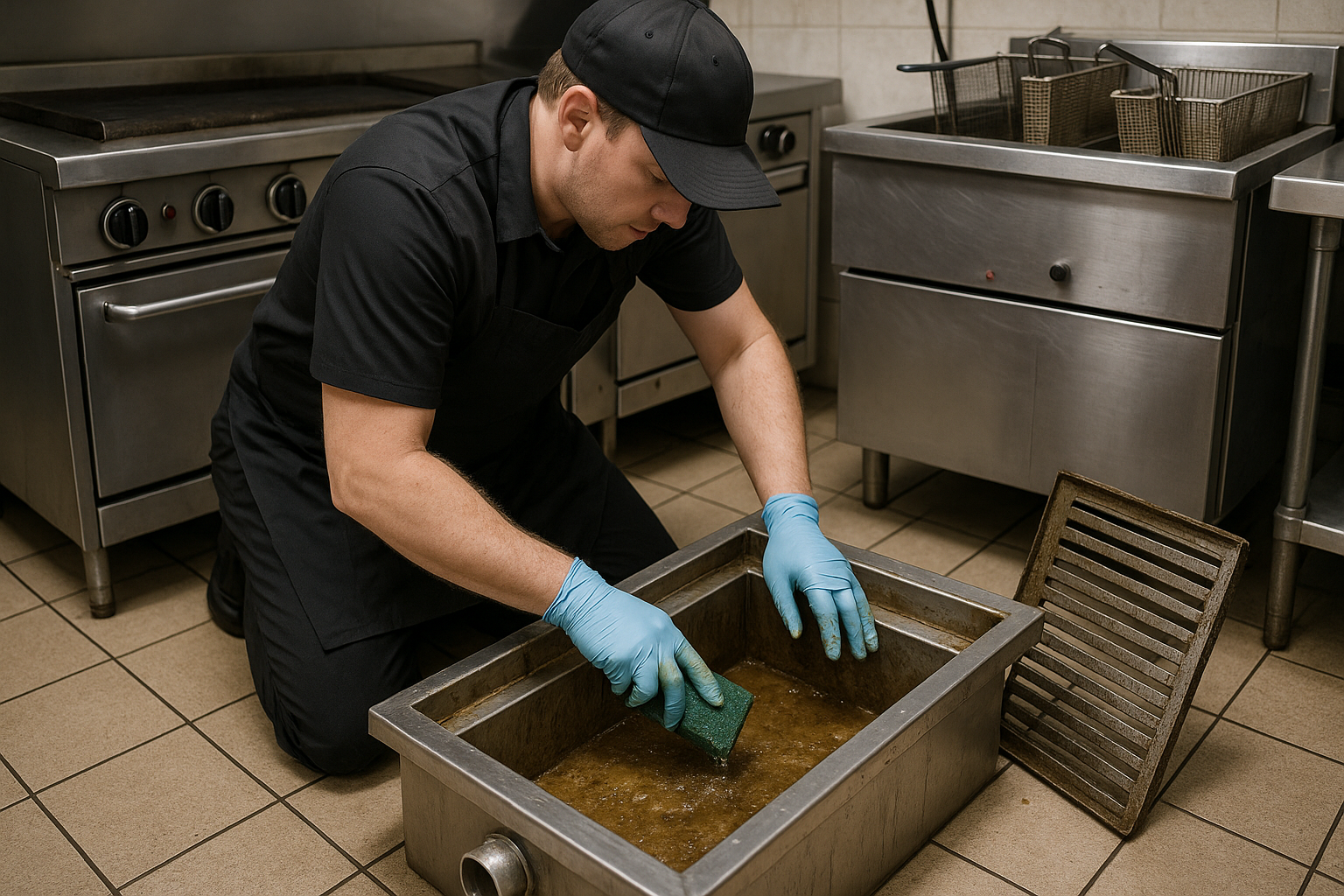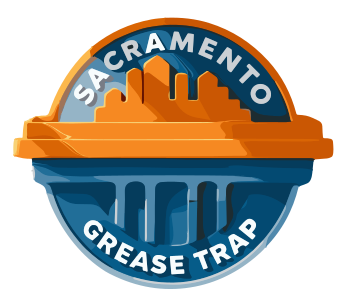Commercial Grease Trap Odor Control Solutions: Keep Your Kitchen Smelling Fresh

Have you ever walked into your commercial kitchen only to be greeted by an unpleasant, lingering odor? It’s one of those moments that can instantly sour your mood and, worse, leave a lasting impression on customers and staff. Grease trap odors aren’t just inconvenient; they can quickly turn a bustling kitchen into a space people want to avoid. Regular commercial grease trap cleaning and restaurant odor elimination services can prevent this from happening before it affects operations.
The good news? You don’t have to live with those foul smells. This post explains why grease trap odors occur and, more importantly, how to tackle them effectively. Whether you run a restaurant, café, or catering business, maintaining freshness is essential to keeping your kitchen comfortable, clean, and compliant.
Odor control isn’t just about comfort—it’s also about protecting your brand and ensuring compliance with local health standards. A proactive grease management program combined with grease interceptor maintenance can prevent costly plumbing issues and improve overall restaurant kitchen sanitation. By incorporating consistent kitchen ventilation cleaning, food service odor control, and eco-friendly odor control methods, you can maintain a professional and pleasant work environment.
From simple maintenance routines to advanced solutions like industrial kitchen deodorizer and odor neutralizer for kitchens, this guide equips you with the strategies to keep your kitchen smelling clean, fresh, and ready for business every single day.
The Evolution and Importance of Grease Trap Odor Control
Grease traps have been vital in commercial kitchens for over a century, designed to capture fats, oils, and grease (FOG) before they clog municipal sewer lines. As the food service industry grew, so did the need for efficient grease trap treatment systems and commercial drain maintenance practices. Modern grease traps are now built for durability and improved odor resistance.
However, odor management has become just as important as preventing blockages. When trapped grease sits too long without cleaning, bacteria break it down, releasing foul-smelling gases. This is where consistent drain odor prevention and trap odor removal service make a significant difference.
Local regulations also require strict adherence to restaurant hygiene maintenance, grease trap waste disposal, and grease buildup prevention to protect public health. For detailed guidance, check out this grease trap compliance checklist to ensure your operations meet every standard.
Advancements like commercial plumbing odor solutions, grease trap deodorizing tablets, and improved trap materials have made odor prevention easier and more sustainable. Pairing these solutions with a professional trap cleaning contractor ensures efficiency and compliance.
By integrating these best practices, you not only enhance your kitchen’s air quality but also project professionalism and care—qualities that set your business apart from competitors.
Understanding How Grease Trap Odors Develop and Linger
To prevent odors effectively, it’s important to understand why they happen. Fats, oils, and grease don’t simply sit idle—they decompose over time, releasing sulfur-based gases and other compounds that create foul smells. Without proper restaurant grease trap pump out and kitchen drainage cleaning, these odors can quickly take over your workspace.
Poor ventilation or neglected kitchen exhaust odor control can worsen the issue, trapping smells and allowing them to spread. Implementing grease buildup prevention and kitchen odor management helps eliminate problems before they affect your customers.
Common odor causes include:
- FOG buildup: Provides an ideal environment for bacteria to multiply.
- Food waste residue: Rotting scraps intensify odors and attract pests.
- Improper maintenance: Skipping cleaning schedules causes buildup and corrosion.
- Ventilation issues: Poor airflow traps and amplifies smells.
- Environmental factors: Heat and humidity accelerate decomposition.
If you want to monitor grease levels more effectively, explore grease trap monitoring systems that can alert you to early signs of buildup before it becomes a problem. Regular maintenance supported by eco friendly odor control and odor neutralizer for kitchens ensures a clean, safe, and welcoming kitchen environment that keeps customers happy and staff motivated.
The Big Benefits of Proactive Grease Trap Odor Control
Taking control of grease trap odors is more than a cleaning task—it’s a strategic investment in your restaurant’s long-term success. Proactive commercial kitchen cleaning service and trap cleaning contractor support deliver multiple benefits that directly impact operations, reputation, and profit.
Key benefits of proactive odor control include:
- Improved Customer Experience: Through consistent restaurant smell control and odor removal for food facilities, guests feel confident in your cleanliness standards.
- Health and Safety Compliance: Meeting sanitation codes and maintaining restaurant waste management avoids costly violations and downtime.
- Cost Savings: Regular grease trap bacteria treatment prevents plumbing emergencies and system failures.
- Enhanced Air Quality: Using a commercial kitchen air purifier reduces lingering odors and improves staff comfort.
- Staff Morale: Clean, pleasant environments promote productivity and job satisfaction.
If you’re unsure how often your system needs cleaning, try using a grease trap capacity calculator for restaurants to determine the right schedule for your setup. Businesses that take odor prevention seriously enjoy stronger customer loyalty, better reviews, and reduced maintenance costs.
Overcoming the Challenges of Grease Trap Odor Control
Even with proper systems in place, grease trap odor management has its hurdles. Time constraints, perceived costs, and maintenance demands can feel overwhelming. Yet, with structured commercial plumbing odor solutions, effective kitchen grease trap repair, and reliable professional support, these challenges become manageable.
Common issues include:
- Time-Consuming Maintenance: Regular cleaning takes effort and coordination.
- Perceived High Costs: Professional cleaning may seem expensive, but it prevents costly breakdowns.
- Unpleasant Tasks: Staff may dislike handling greasy equipment.
- Unexpected Odor Surges: Seasonal heat or humidity can worsen smells.
Practical strategies to overcome challenges:
- Set up a maintenance schedule for timely service.
- Use eco friendly odor control and odor control chemicals between cleanings.
- Partner with professionals for grease trap inspection service.
- Apply grease trap deodorizing tablets for long-lasting freshness.
For businesses seeking automated solutions, investing in automatic grease trap cleaning systems can greatly reduce manual effort while maintaining consistent results. Collaborating with a commercial kitchen cleaning service and a trusted trap cleaning contractor can save time, reduce stress, and keep your kitchen’s air crisp and inviting year-round.
Putting Grease Trap Odor Control Into Action
Now that you understand what causes odors and how to prevent them, it’s time to take practical steps. Implementing a consistent plan that includes regular commercial grease trap cleaning and grease interceptor repair service ensures long-term success.
Follow these key steps:
- Schedule regular maintenance with professional services.
- Use eco friendly odor control products and odor neutralizer for kitchens between visits.
- Conduct routine kitchen ventilation cleaning and food grease removal tasks.
- Apply restaurant odor prevention tips across daily operations.
- Install or upgrade a commercial odor management system for smart monitoring.
Track your results and adjust schedules based on usage levels or seasonal demand. Combine manual inspections with tools like grease trap treatment systems and enzyme-based cleaners for best results. Maintaining consistency in kitchen odor management routines ensures a clean and compliant kitchen that reflects professionalism and pride.
The Future of Grease Trap Odor Control: Trends to Watch
The future of odor management in commercial kitchens is all about innovation, efficiency, and sustainability. With technology rapidly advancing, modern grease trap treatment systems and commercial odor management systems are changing how kitchens operate.
Top trends to watch include:
- Smart monitoring systems: Real-time sensors detect grease buildup and notify staff early.
- Eco-friendly enzyme treatments: Sustainable grease trap additives replace harsh chemicals.
- Automated cleaning technology: Reduces manual labor and ensures consistent hygiene.
- Data-driven maintenance scheduling: Predicts cleaning needs and optimizes costs.
- Regulatory improvements: Stricter environmental codes promote sustainability.
You can explore practical tools for these innovations in this guide on automatic grease trap cleaning systems for restaurants. Forward-thinking operators who embrace these advancements gain a competitive edge, ensuring better air quality, fewer maintenance surprises, and a stronger reputation for sustainability and cleanliness.
Bringing It All Together: Fresh Kitchens Start Here
Keeping your commercial kitchen odor-free requires consistent restaurant hygiene maintenance, timely grease interceptor maintenance, and reliable industrial kitchen deodorizer solutions. By staying proactive, your kitchen can remain fresh, compliant, and welcoming to both staff and guests.
A combination of commercial grease trap cleaning, drain odor prevention, and partnerships with a trap cleaning contractor ensures your business avoids odor-related disruptions. Regular use of eco friendly odor control, grease trap additives, and odor neutralizer for kitchens supports continuous freshness between cleanings.
Clean air, smooth plumbing, and odor-free spaces don’t just meet standards—they elevate your brand. When guests walk into a pleasant-smelling kitchen area, they associate it with professionalism, safety, and quality.
With structured routines and the right food service odor control tools, maintaining a clean, efficient kitchen becomes easier than ever. It’s time to let your kitchen smell as good as the food you serve—fresh, inviting, and truly professional.
Final Thoughts: Keeping Your Kitchen Fresh and Thriving
Effective food service odor control demonstrates professionalism, consistency, and care. Implementing a clear grease management program, routine restaurant grease trap pump out, and ongoing kitchen drainage cleaning helps prevent odors before they begin.
Small, consistent actions—like regular inspections, kitchen ventilation cleaning, and restaurant odor prevention tips—make a lasting impact. A reliable commercial odor management system further streamlines the process by automating reminders and tracking performance.
Your commitment to odor control improves staff morale, supports compliance, and builds trust with your customers. When every corner of your kitchen reflects cleanliness and attention to detail, it enhances both your reputation and your bottom line.
By maintaining proactive commercial grease trap cleaning and following expert resources such as the grease trap compliance checklist, you’re investing in more than cleanliness—you’re safeguarding the long-term health and success of your business.
A fresh-smelling kitchen is a thriving kitchen, and that’s exactly the kind of environment that keeps customers coming back.

Let Us Simplify Your Grease Trap Maintenance.
Proper grease trap maintenance will reduce costly repairs in the future.
.avif)

